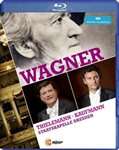|
Back
04/03/2014
Richard Wagner: Der fliegende Holländer: Overture – A Faust Overture – Rienzi: “Allmächt’ger Vater” & Overture – Lohengrin: Prelude & “In fernem Land” (original version) – Tannhäuser: “Inbrunst im Herzen” & Overture
Hans Werner Henze: Fraternité. Air pour l’orchestre
Jonas Kaufmann (tenor), Staatskapelle Dresden, Christian Thielemann (conductor)
Recorded at the Semperoper, Dresden, Germany (May 21, 2013) – 108’
C Major Blu-ray 715004 (or DVD 714908) – Picture format: 16:9 NTSC 1080i Full HD – Sound format: dts-HD Master Audio 5.1, PCM Stereo – Subtitles in German, English, French, Spanish, Korean, Chinese – Blu-ray disc with booklet essays in English, German, and French

   
It is hard to overstate how important Wagner’s years in Dresden were. While Bayreuth is typically the city most associated with Wagner, it was Dresden where Wagner achieved the formative post of Court Opera Conductor and where his mature, most lyrical works were written and performed. Surely operas such as Lohengrin and Tannhäuser captivated the Saxon audiences with their richness and earnestness of drama. Such novelty is captured here, over 150 years later as Wagner’s orchestra, the Staatskapelle Dresden, and their music director Christian Thielemann explore excerpts from Wagner’s Dresden years in celebration of the composer’s bicentennial.
This is an affair entrenched in admiration: between conductor and composer, soloist and orchestra, audience and performers. Thielemann, conducting virtually from memory, has an affinity for this music, not only apparent through his reserved smile, but his impressive intimacy with its inner workings. Thielemann gives the music, and his players, space. He conducts with simple gestures, but reserves the thunder and prodding for when needed and applies them effectively. His readings of the Der fliegende Holländer and Rienzi overtures are never pressurized. They’re naturally dramatic, the former with lyric sweep, the latter with a jovial militarism.
Thielemann has a way of measuring his resources, never allowing the players to wallow in the developing themes. It is an approach with convincing results. While the Prelude to Act I of Lohengrin lacks some of the ethereal awe of the supernatural, the measured pace betrays a form of utter perfection and craft the piece contains. The simple elegance of the strings melt phrase into subsequent phrase astonishingly beautifully.
In Jonas Kaufmann, this celebration not only features the preeminent Wagner singer of today, but a once-in-a-generation voice whose every performance is a notable occasion. What’s so amazing about Kaufmann is not only the stentorian majesty of his high notes, it is the ease he displays throughout his range, particularly his head voice which he uses to stunning effect. “In fernem Land,” from one of his calling cards, Lohengrin, is a perfect example. In it, Kaufmann sings the delicate opening phrases with breathtaking control and consistency. His performance is captivating, his entire physique engaged in the Knight’s story. This expanded, original version of the piece is most welcome.
Kaufmann’s other contributions, from Rienzi and Tannhäuser, find him equally mesmerizing. The former is an impressive example of the tenor’s lyric line and breath control, as well as the range of colors he is able to portray. The latter is smoldering and tormented. Fans of the German tenor understandably await his full portrayal of the role with eagerness.
The other pieces on the concert are crowned, most fittingly, by the Tannhäuser overture, which closes the program movingly. Wagner’s Faust Overture is captivating and probing. Fraternité from the late Hans Werner Henze is the only non-Wagner piece on the program, but the color and expressivity of it, played with admirable precision by the Staatskappelle, makes it a fitting addition. Undoubtedly, its dissonance and chromatic characteristics owe a great debt to the composer’s predecessor.
The entire presentation is a joy. The Semperoper sparkles in beautiful high definition. Camera angles are thoughtfully directed. The 5.1 surround sound is rich and splendidly detailed.
This is an exceptional release that captures a momentous occasion. While the performances are as outstanding as expected, there is more here: a potentially legendary tenor captured in his prime, and a burgeoning relationship between director and orchestra with limitless potential in this music. There is a disarming directness in these performances of Wagner that are faithful to the music but exceedingly affecting—recommended for all, not just Wagnerites.
Matthew Richard Martinez
|